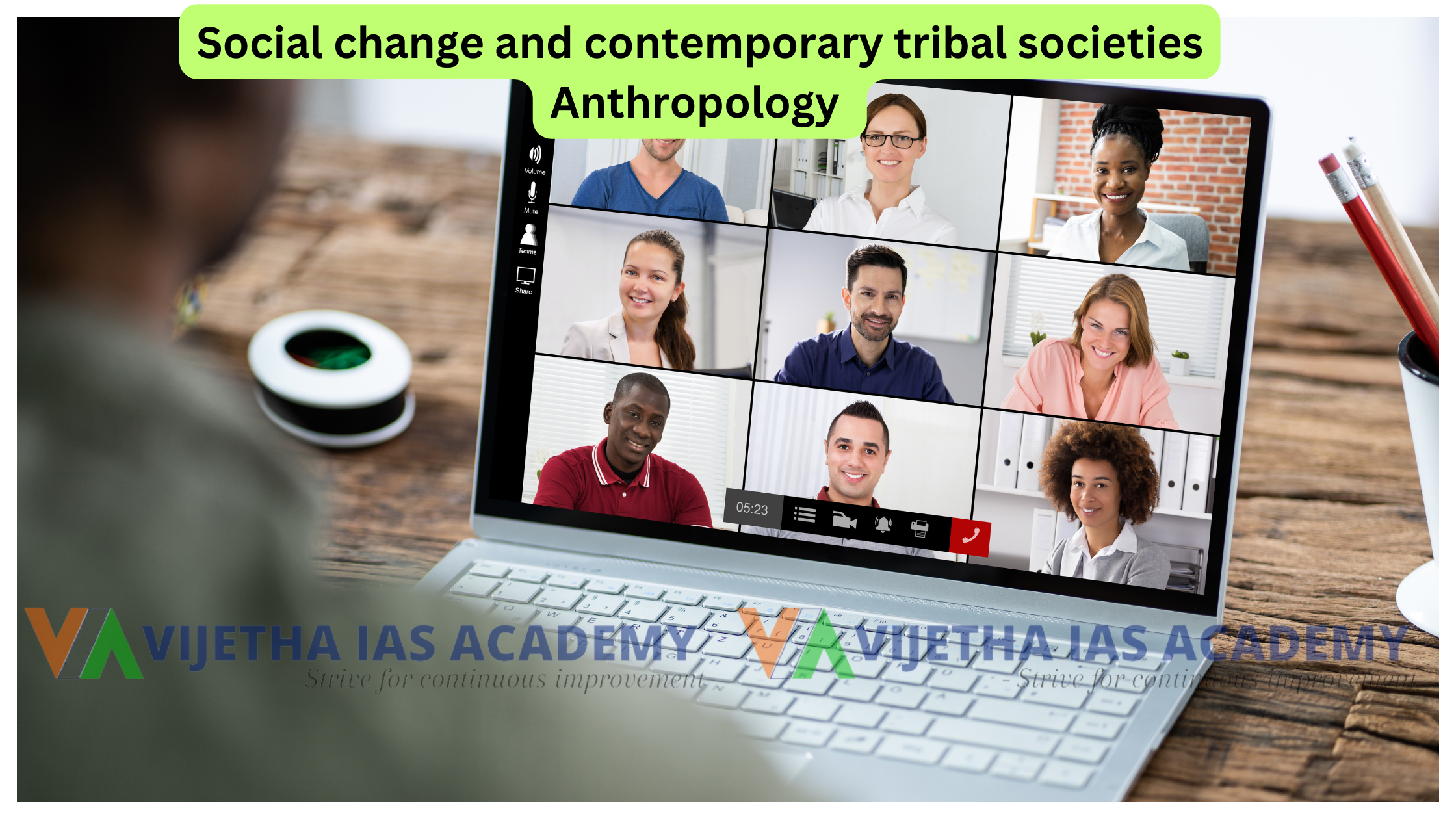
Social Change and Contemporary Tribal Societies: An Anthropological Perspective for UPSC Aspirants
The study of social change and its impact on contemporary tribal societies is a crucial topic for aspirants choosing Anthropology as their optional subject for the UPSC exams. This article provides an in-depth exploration of these dynamics, offering insights and resources such as the highly regarded Social Change and Contemporary Tribal Societies at Vijetha IAS Academy and the expertise of Kishore sir Anthropology.
Understanding Social Change in Tribal Societies
Social change refers to the significant alteration of social structures and cultural patterns over time. In tribal societies, these changes can result from various factors such as economic development, political policies, cultural integration, and technological advancements.
Historical Context
Traditionally, tribal societies in India have been characterized by their distinct cultural practices, subsistence economies, and social organization. Historically marginalized, these communities have often struggled to preserve their unique identities in the face of external pressures.
Factors Driving Social Change
-
Economic Development: Government initiatives aimed at economic development have led to significant changes in tribal livelihoods. The introduction of agriculture, mining, and industrial projects has transformed traditional economies.
-
Political Policies: Policies like the Fifth Schedule and the Panchayats (Extension to Scheduled Areas) Act (PESA) have aimed to empower tribal communities, though their implementation has seen mixed results.
-
Cultural Integration: Increased interaction with mainstream society through education, migration, and media has led to cultural assimilation and changes in social norms.
-
Technological Advancements: The advent of modern technology, including communication and transportation, has had profound impacts on tribal societies, facilitating both development and cultural erosion.
Economic Transformations
Shift from Subsistence to Market Economy
Traditionally, tribal economies were based on subsistence agriculture, hunting, and gathering. With the introduction of market economies, there has been a shift towards cash crops, wage labor, and commercial activities. This transition has led to both opportunities and challenges, including loss of traditional knowledge and environmental degradation.
Land Alienation and Displacement
Economic projects, such as mining and large-scale agriculture, have often resulted in land alienation and displacement of tribal communities. This has led to significant social and economic disruptions, including loss of livelihoods and cultural disintegration.
Social and Cultural Changes
Education and Social Mobility
Access to education has increased among tribal communities, leading to greater social mobility and integration into mainstream society. However, educational attainment among tribals still lags behind national averages, and dropout rates remain high.
Changes in Family and Kinship Structures
Social change has also impacted family and kinship structures in tribal societies. There is a noticeable shift from extended family systems to nuclear families, influenced by economic pressures and urban migration.
Religious and Cultural Practices
Exposure to mainstream religions and cultural practices has led to changes in tribal religious beliefs and rituals. While some communities have adopted new religious practices, others strive to preserve their traditional beliefs amidst external influences.
Political Empowerment and Challenges
Tribal Autonomy and Governance
Policies like PESA and the recognition of Scheduled Tribes (STs) aim to provide political autonomy and self-governance to tribal areas. However, the effectiveness of these policies is often undermined by inadequate implementation and lack of awareness among tribal populations.
Advocacy and Resistance Movements
Tribal communities have increasingly organized themselves to resist exploitation and assert their rights. Movements such as the Narmada Bachao Andolan and the Jharkhand Movement highlight the struggles for land rights, cultural preservation, and political recognition.
Health and Well-being
Traditional vs. Modern Healthcare
The introduction of modern healthcare facilities has improved health outcomes in tribal areas. However, traditional healthcare practices and indigenous knowledge continue to play a significant role in tribal societies. Balancing these two systems remains a challenge.
Nutritional and Health Challenges
Despite improvements, tribal communities often face significant health challenges, including malnutrition, high infant mortality rates, and lack of access to clean water and sanitation. Addressing these issues requires culturally sensitive health interventions.
Anthropological Insights for UPSC Aspirants
For UPSC aspirants, understanding the nuances of social change in contemporary tribal societies is essential. The Anthropology Optional syllabus includes detailed study of tribal communities, their socio-cultural dynamics, and the impact of various factors on their lives. Kishore sir Anthropology provides expert guidance on these topics, helping students develop a comprehensive understanding.
Key Areas of Study
- Theoretical Frameworks: Study theories of social change and their application to tribal societies.
- Economic Impact: Analyze the shift from subsistence to market economies and its consequences.
- Social Structure: Examine changes in family, kinship, and community structures.
- Cultural Dynamics: Understand the transformation of religious practices and cultural identities.
- Political Policies: Evaluate the effectiveness of policies aimed at tribal empowerment.
- Health and Well-being: Explore the intersection of traditional and modern healthcare practices.
Resources for Preparation
To excel in this subject, aspirants can utilize resources from Vijetha IAS Academy, which offers specialized courses tailored for the Anthropology Optional. The academy's comprehensive study material and expert faculty, including Kishore sir Anthropology, provide invaluable support for thorough preparation.
Conclusion
The study of social change and contemporary tribal societies offers rich insights into the dynamic processes shaping India's diverse cultural landscape. For UPSC aspirants, mastering this topic not only enhances their understanding of anthropology but also equips them to contribute meaningfully to the development and empowerment of tribal communities.
By leveraging resources like Vijetha IAS Academy and the expert guidance of Kishore sir Anthropology, aspirants can develop a nuanced perspective on these complex issues, thereby enriching their preparation and increasing their chances of success in the UPSC exams.
